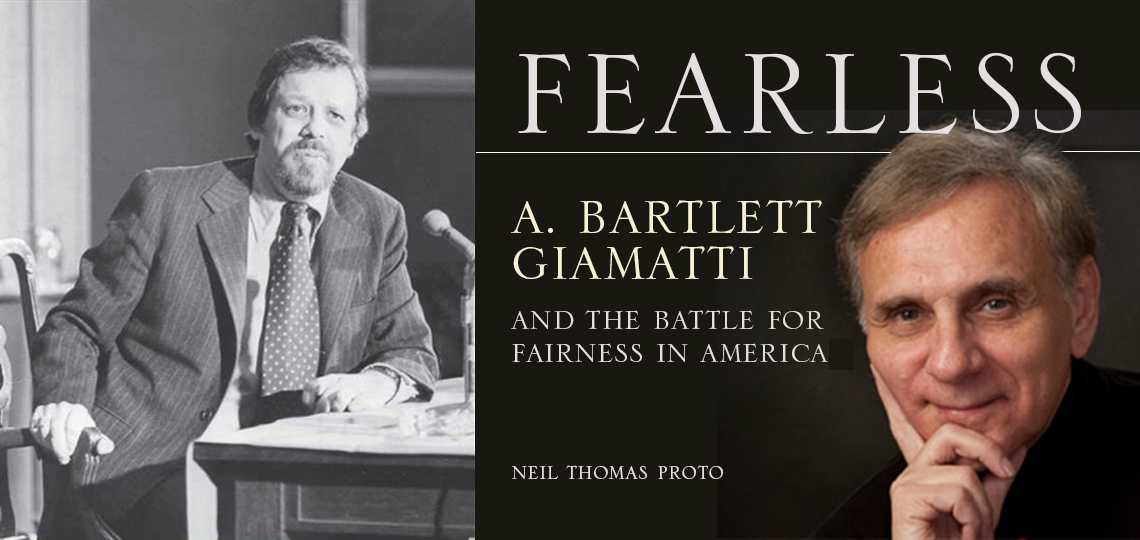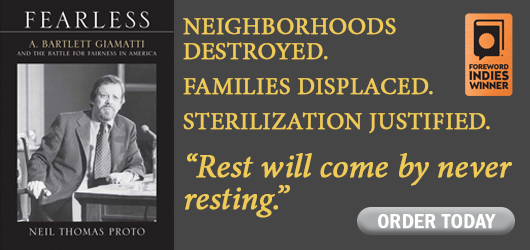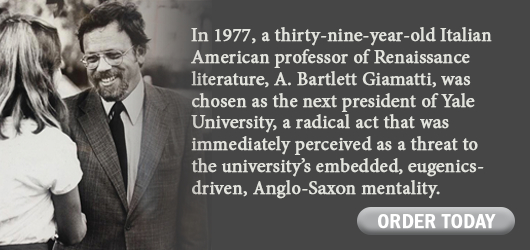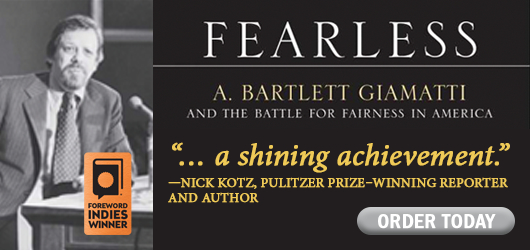Fearless—2020 INDIES Book of the Year Award Winner

The short list of great Americans of the 20th century would be incomplete without the extraordinary A. Bartlett Giamatti—professor, Renaissance scholar, author, president of Yale University, and, improbably, Commissioner of Major League Baseball—the sort of guy who notes that Odysseus cheated at the Funeral games when writing about Major League Baseball’s incessant cheating problem.
A Renaissance man, indeed. But Giamatti was, foremost, a man of the people. In 1978, upon being named Yale’s youngest president in two hundred years, a colleague joked, “A human being as president of a university—my God, what will that be like?”
We recently discovered an excellent new Giamatti biography, Fearless: A. Bartlett Giamatti and the Battle for Fairness in America, and wasted no time in setting up the following interview between our executive editor and author Neil Thomas Proto.
Southern Italian immigrants to the US were subject to fierce prejudice and violence in the late 1800s and early 1900s, a time when more than four million—the Great Migration—left their homes in Southern Italy. Notably, Northern Italians, in fact, worked to instill the same sense of racism against Southern Italians in America as existed in Italy for centuries. Consequently, you write, “American immigration officials categorized Southerners separately.” Bart’s paternal grandparents, from the Naples region of Southern Italy, and their extended family experienced this bigotry firsthand. How would his knowledge of, and sensitivity to his grandparents immigration experience serve him for the rest of his life?
Bart was acutely aware of discrimination, as a historian, a witness, and in his personal experience at Yale. It formed, in an informed, reasoned, and historical way, the depth of his empathy for how discrimination harmed others, and the magnitude of his commitment to fairness—that is, the battle to ensure fairness. Essential to that commitment was the critical need, which he undertook, to probe, listen, see, and understand fully and accurately what was not easily visible among people and ideas. This included the often misunderstood and deliberately misrepresented history of Italy— all of it, the ugly repression and destruction by the North of people and villages in the South, and especially the contributions of those living in the South to the culture we think of as Italian as well as their enduring, often hard-fought contribution to communities and lives in America.
Bart also retained for his entire life the immigrant imperative for striving—what he poignantly described as “rest will come by never resting.”
That striving took two essential forms for him. First, to find and define his place in America on terms and with values that mattered to him, not what others said and certainly not what he and his father were told to be. Second, to recognize the fate of uncertainty, which his study of the Renaissance and the southern Italian culture revealed to him as the notion of mutability, the constancy of change—with the presence of uncertain misadventure, evil, deception—and, in his way, how to challenge the uncertainty of change through persistence.
Yale’s role in fostering the eugenics movement is an eye-opening surprise of Fearless, in addition to the university’s longstanding anti-Semitism and intolerance toward African Americans. Can you talk about this disgraceful period and why the highest reaches of academia and politics were drawn in by eugenics theories, believing that certain immigrants—“degenerated Mediterraneans”—were unfit for admission to the United States?
The historical and cultural foundation for learning at Yale was Calvinism in a nation founded by White Anglo-Saxon Protestants: its essential, predestined imperative for “the elect” among them was to set the law in a powerfully autocratic and arbitrary way. Under eugenics, the inherited condition of being “fit” and “unfit” was determined by White Anglo Saxon Protestants and required the powerful and powerfully denigrating response—the institutionalization, sterilization, and exclusion—of Southern and Eastern European immigrants, African Americans, and anyone potentially able to dilute the WASP gene pool, including epileptics, people with autism, people with so-called immoral tendencies, alcoholics, anyone with physical constraints, and women with large breasts.
Yale’s Institute of Human Relations, which still stands, was built adjacent to the Medical School to foster and advocate globally, but especially in New England and the South, all of those racial, ethnic, and cultural imperatives. That underlying mentality has never left Yale: it underpinned its role in urban renewal in the 1950s and 1960s, in the destruction of ethnically and racially integrated neighborhoods and Yale’s deliberately planned purchase of abandoned or neglected lands at below-market prices or with federal money.
Despite Bart’s effort while president, that mentality persists in Yale’s presumptive comfort in creating “leaders”—the euphemism used to ensure only the “Yale man” or the person who will be remade into one would be admitted into Yale college to ensure that distinct “elect” Yale character. Two of the most notorious eugenicists at Yale were its one-time president, James Rowland Angell and Yale professor and Connecticut Governor Wilbur Cross. Angell spoke explicitly of the need for an “Armenian massacre” in New Haven targeting Yale’s Italian, Jewish, and African American neighbors. Cross advocated the creation of a Secretary of Eugenics on the federal level, praised the greatness of John C. Calhoun, a Yale graduate, and, as governor established and welcomed the findings of a special study to increase the rate of sterilization of the “unfit” beyond what was already permitted in Connecticut. To this day, the Yale Alumni Association gives an annual award in his name. There was no “period” of eugenics thinking, mentality, and conduct at Yale.
Bart’s mother was an accomplished scholar of Italian and Etruscan art, and his father’s showed devotion to his mother and sisters, as well as teaching at the all-women’s Mount Holyoke College, all offered him a keen understanding of “the dreams of women from rural, working-class families of varied religious and ethnic backgrounds and that he knew how to intercede to ensure that they were treated fairly and equally.” With the example of his parents in mind, how will Bart be remembered in light of his treatment of women throughout his life?
I don’t think he considered his values and conduct with respect to women exceptional. From the outset of his childhood, Bart interacted daily with a very accomplished and outspoken sister, Elria, with whom he was very close, and with close women friends throughout grammar and high school with whom he engaged in friendships, debate, school functions, oratory, and dances. So he found it odd, then ridiculous when he reached Yale and witnessed the awkwardness and condescension that male students, and later Yale President Kingman Brewster, treated women students. Brewster especially told the first entering class of women that Yale would create “1,000 men leaders.” Bart’s wife, Toni Smith Giamatti, an accomplished, highly regarded, private school English teacher, was the first professional wife of a Yale president in the University’s history to practice her profession. When the announcement was made that Bart had been named president, he was asked how it might change his family life, especially Toni’s professional life. His reply was blunt. He said, more than once, in effect: “It is her choice. She is an excellent English teacher, a subject I know well and I can attest to her knowledge and skill, and she intends to continue.”
Because they both also experienced theater and acting—it’s how they met—they worked closely together on Bart’s major speeches to ensure that both their substantive content and their method of delivery conveyed precisely the principles that, they both knew, were critical to change at Yale and to the education and fair treatment of young people entering and leaving Yale. That cooperative skill also mattered in the transformation of Yale’s theater program into a student-centered, at times community-centered, learning and training discipline.
A professor’s son, please help us understand Bart’s admiration for his father, as it factored into his decision to follow his father into a teaching career? Were his words—“I think I learned all my real lessons from my father.”—a sort of predestination, or did he deliberate over other careers?
I think from the outset of forming serious thoughts about his own life, late in high school and at Philips Academy, Bart recognized the special meaning of public and civic duty through the responsibly led private life. Within that framework, aspirations could be broad and personally and communally gratifying. That was the lesson he learned from his father and held onto as his own experience widened and in some respects narrowed when he entered Yale. And, in important respects, that lesson arose from his mother, and from his childhood friends, whom I met and interviewed for Fearless.
He also realized that athletics, sport, the game, included a diversity of people, with skills and ethical responsibilities that were warmly felt extensions not of his father but of the values that mattered to his father.
Bart expanded that view, in ways (writing and speaking) that were remarkably engaging not only to him but—and here’s the civic duty of his private life—to a broader and diverse public of both sports fans and serious sports writers and thinkers.
When he wrote about cheating in baseball, Bart didn’t hesitate to find its origins in classical sources, such as when “Odysseus cheated in the Funeral games at the end of the Iliad.” Foremost, as his writing brought him more attention, he very thoughtfully sought relationships with those who lived baseball and who wanted to know him for himself, the socially accessible Bart Giamatti, the Italian American. Roger Angel, of the New Yorker, Joe Garagiola, the baseball commentator, and major league team owner Bud Selig, sought him out. Other owners and managers did as well. Becoming president of the National League was less “unexpected good fortune” than was often imagined.
Bart explored theater by acting in college and by thinking about how the use of this public act in private life could be of value in teaching and communally. At Yale, he actively engaged in raising money for charitable giving in part to understand the city where is grandparents immigrated, his father was born, and his family lived.
And then there always was Dante, not only as a poet filled with irreverence, but the poet who was profoundly committed to The City, to the life and fate of the citizens of Florence, which mattered in how he viewed himself and the public good in the place he called home.
Bart recognized that he could support the civic good by working with the mayor of New Haven and by speaking out, in thoroughly reasoned, principled-based ways on important, often controversial issues that allowed him to be, in critical ways, a visible “public official.”
He considered and declined an offer to run for the United States Senate in Connecticut as an independent. He had learned that he could exercise the responsible duty of citizenship as a private person, which he affirmed again when he became President of the National League and Commissioner of Baseball and continued to address issues of national importance beyond the constraint of baseball.
Bart earned a PhD in Comparative Literature from Yale in June of 1964, with a special interest in English literature, Renaissance studies, and Dante and Spenser specifically. Where did that interest develop, and how would it factor into his later pursuits as a professor and Major League Baseball executive?
Bart’s parents shared a knowledge of Italy, the Italian language, and Etruscan history and artifacts. The Renaissance and its broader meaning for the transformation and spread of knowledge (Greek, Latin, and translations in multiple languages throughout the Middle East, Europe, and Northern Africa), including in Great Britain, were central to that shared knowledge. Bart’s parents took the entire family to Italy twice—to Florence and Rome—during Valentine [Bart’s father] Giamatti’s year long sabbaticals from Mount Holyoke College.
Bart’s serious introduction to Comparative Literature and English began at Yale. He arrived at a time when those subjects, and the Yale faculty (which included Robert Penn Warren, author of All the King’s Men), garnered national attention. Bart focused on Edmund Spenser, and Bart’s first book deals with various poets, but especially Spenser, who wrote the grand epical quest, the tortuous and dangerous journey filled with moral and ethical challenges, often to attain the ultimate tranquility, Elysian. In an important respect, the melding of these broad and deep forms of knowledge, and the range of languages involved to understand and teach them, reflected the cultural histories of both of Bart’s parents.
The perspective this education provided is critical to understanding Bart and the intellectual and practical insight and knowledge that formed his principles for living. It mattered in the way he approached teaching and the persistence of his learning, writing, and speaking through his time as Commissioner of Baseball.
His teaching, first at Princeton and then at Yale, included a method that reflected his skill at oratory and acting. His decision to require the kinds of broad and intense reading of Dante and Spenser and other writers changed the curriculum, especially at Yale. He was a remarkably engaging, engaged, and approachable teacher. He was praised for his breadth of knowledge, and the value he placed on the humanity of insightful writing. He included African American literature and its teachers, whom he encouraged as deeply important to the broad perspective of learning he embraced.
Baseball was an Epical Quest to ensure the authenticity of the game on and off the field. I’ve written elsewhere about Bart’s three lectures on Baseball at the University of Michigan Law School, particularly on the premeditated act of cheating, and on the unhealthy and dangerous formation of the cult culture—the exemption from rules of ethical conduct—that he readily recognized, including in the attitude and conduct of Pete Rose. More importantly, he laid out his principles for the quest that mattered: the battle for integrity in baseball, where, in all likelihood, he would confront the owners and their insatiable embrace of greed.
That perspective helped develop his reputation for embracing fans and writers and for defending and showing respect for umpires and their duty. He believed fans were the beneficiaries and umpires the protectors of the game and that owners had a public duty. His reputation was further enhanced by the notable fact that the first organized game of baseball was held in Hoboken, New Jersey, on Elysian Field.
In reference to Bart, you write, “No principle was more important than this one: the journey matters. The ethical and moral judgments one makes in the journey are of practical meaning to the success and emotional warmth of attainment, that wherever ‘Paradise’ may be located—and Giamatti described location almost exclusively in geographic terms—the journey refers to ‘a way of life’ in getting there.” These are not the intellectual guideposts of an average man. Would his sense of romantic idealism find him out of place in the twentieth century? (Was he born a few centuries too late?) And do you believe these transcendent beliefs were the keys to his success in life?
Let me start at the end. Yes. He was solidly suited for the 20th century, more than most. He understood, from study and experience, the tumult and exploitation of the 20th century. He recognized the exploitation of discrimination, and the threats, often borne of the tumult, to principles of freedom of expression. Keep in mind, as Bart did, that no one was more irreverent than Dante or more devoted to civic duty. Bart’s beliefs and skill played out foremost in his early writing and in his teaching methodology, which were quickly recognized as exceptional, and led to his unprecedented rise in the nation’s harshest academic environments: Princeton and Yale. Those same principles always melded with a very 20th century character trait: he was profoundly social. He embraced students in dialogue and workers in daily banter, he never withdrew from debate or dialogue, and he lived through and spoke about the Free Speech movement and Mario Savio at Berkeley, and the rough undercurrents of discontent and observation of the Beat Generation writers. Yet, he had a historical and intuitive sense of the value of listening.
It mattered to others, at Yale, in New Haven, and in baseball, that he was an informed, active Boston Red Sox fan since childhood, and that he wrote about baseball and other sports with insight, historical knowledge, and empathy—which I’ll come back to through our discussion—and articulated the practical way they mattered in America. Baseball was a profoundly 20th century game, especially notable for aspiration and the meaning of family leisure and childhood memory.
All of those attributes are related and entwined. They made him fearless in battle, and he keenly understood when battle was necessary. These battles arose at Yale, when he challenged the presumption of “leadership” that Yale benighted its students with and that he despised as exclusionary and condescending, when he advocated for Yale’s duty to ensure responsible citizenship for the public good, when he defied the Yale Corporation’s and Alumni’s unwillingness to recognize and protect gay rights, and when he recognized—and here he is like Dante in the 14th century—Yale’s duty to New Haven especially in educational programs and Yale scholarships for local public school students, which had been stopped by his predecessors because of the changing composition of the local schools. Those battles also encompassed the larger nation, where he provided a fulsome, deeply reasoned and very public critique of the Moral Majority and Jerry Falwell for their narrow, bigoted attack on diversity of thought and the freedom to express it, when many others in public life shied away from the challenge.
Further, Bart knew strategy and had the intellectual rigor to pursue it. He was the person you wanted on your side when entering battle, no matter how defined. That, of course, played out in a very public way in baseball, not just the Pete Rose controversy but in the principled framework, not just rules but the values that required strong advocacy and enforcement to ensure the game retained its authenticity on and off the field.
He was indeed exceptional. But an essential thread in his life was that he found principles of conduct in the 14th and 15th centuries and in the ongoing journey in life for ways of living that had enduring meaning and practical value in the 20th century. And he acted on it.
Bart is perhaps best known for his time as the commissioner of Major League Baseball in the late 1980s, albeit briefly. What made the game so appealing to him as a boy, and why was he an attractive commissioner pick for the owners?
Baseball, certainly through Bart’s generation, was a game of memories. Memories of family—for him, it was his grandmother, who was a Boston Red Sox fan during the era of Smokey Joe Wood, and Babe Ruth—and of easily accessible role models on the field, men who often were the sons of immigrants or farmers or came from the Negro Leagues, and, in his childhood, baseball made the “promise” of fairness, as he later called it as commissioner-elect, to Jackie Robinson and had not yet lived up to it. Boys could play, no matter their skill, and the format, the field, rules, gloves, and the strategy were the same for kids as it was in the majors. In a moment of making the play—the slide, the catch, the throw to third—you could be Ted Williams, Roberto Clemente, or Bobby Doerr, who’d been transformed into available picture cards and understandable statistics. For Bart, throughout his life but certainly in childhood, public high school, at Philips Academy and Yale, baseball teams meant diversity in ethnicity, race, and financial means made into a team on the field.
In answering your question, I think it matters that I still have my Little League glove and trophies.
Major League Baseball, since the advent of the singular commissioner, Judge Kenesaw Mountain Landis, had, at times—by dint of forces bigger and more ominous than the self-centered, general greed of owners and manages—warranted the selection of men outside the game. Baseball has always had dark forces—the 1919 Black Sox scandal was a notoriously public example. And vigilance to uncover and stop it was always required.
Commissioner Peter Ueberroth, Bart’s predecessor, was in business and had organized a very successful Olympics. But Ueberroth had made a poor judgment; he played to the owners selfish greed: the collusion, wholly illegal, to deny players the earned right to change teams and seek additional compensation. Ueberroth and the owners were caught and embarrassed, and the dark force in baseball was shown to be internally generated. Bart Giamatti had written about Baseball as a professor and as president of Yale—his Tom Seaver article and his “It breaks your heart” article were immediately considered awesome, distinguishing, and needed display of moral insight and appreciation from a fan of the meaning of the game. He had met participants in the game, owners, coaches, writers, and sportscasters, including through their visits to Yale as speakers. Bart had serious, sometimes successful, often contentious battles with faculty, the Yale Corporation (trustees), with labor, and with those who acted with discriminatory intent toward him and others. And he was social, in all the right, accessible ways. He could do battle. In time, however, all of those attributes—when directed against the selfish greed of owners, managers, or players, which I’ve written about elsewhere—would have been roughly confrontational. He was prepared to engage in an epical battle. Banning Pete Rose was just a prelude.
Please talk about the book title, Fearless, as it relates to Bartlett Giamatti?
Intellectually and practically, Bart Giamatti did not seek a safe haven. He welcomed debate, and he insisted that positions, especially his own, be principled, reasoned, and informed. The adversary’s power or authority or history of intimidation didn’t matter. Foremost, in life, at Yale, and in baseball, he recognized and despised unfairness, no matter the person or group, the religion or the race or ethnicity. “Fairness” was always in the book’s subtitle. I choose not to qualify it in any way. And, what Bart recognized and witnessed was that the discrimination directed against his father or him, especially at Yale, warranted empathy in understanding how discrimination affected others, and that the empathy required purpose. That is, “The Battle for Fairness.”
As I interviewed people who knew Bart, three times and months apart, individuals used “fearless” to describe him, yet in distinctive ways. First it was Professor Robert Hollander of Princeton, a Dante scholar who became a close friend to Bart and a teaching colleague. He described the “fearless” way Bart sought the truth. Then his childhood friend, Andy Vitali, described how Bart, in touch football games in grammar school led is team against rougher, bigger teams, that he was “fearless” on the field. And then Notre Dame president and famed civil rights leader, the Reverend Theodore Hesburgh, used it to describe Bart’s forceful advocacy of civic responsibility and denunciation of the bigotry of the Moral Majority, when few university presidents were national spokespersons for principle, as few are today. I’d add a fourth, my own, that flowed from the other three. Although the book deals only with its origins, Bart was fearless when he took on cheating and gambling by the once-iconic Pete Rose and, in doing so, he set out the principles he’d rely on in the epical battle for ethical and moral authenticity in baseball he knew was coming. Sadly for baseball and its fans, he died too soon to engage in that needed battle.
Matt Sutherland



